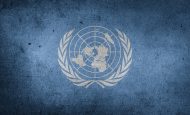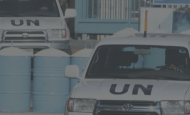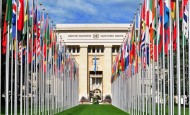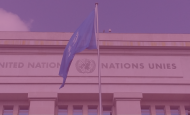The UN Commission of Inquiry’s Second Report: The Continued Assault on Israel
On October 27, 2022, the UN Human Rights Council (HRC) “Independent International Commission of Inquiry on the Occupied Palestinian Territory, including East Jerusalem, and in Israel” (COI) presented its second report at the Third Committee of the UN General Assembly.
In it, the COI purports to “investigat[e] the human rights and legal consequences of the prolonged occupation, including whether, as part of its occupation regime, Israel has, to all intents and purposes, ‘annexed’ wholly or partly the Occupied Palestinian Territory, and providing concrete recommendations to relevant stakeholders.”
These “concrete recommendations” included a call for the International Court of Justice (ICJ) to “advise on the legal consequences of the continued refusal by Israel to end its occupation,” and for the International Criminal Court (ICC) to “prioritize the investigation into the situation in the Occupied Palestinian Territory.” The Commission also promoted discriminatory BDS campaigns, stressing that “business enterprises are contributing to Israel’s expropriation and exploitation of Palestinian land and resources and are supporting the transfer of Israeli population into the Occupied Palestinian Territory.”
In June 2022, following the presentation of its first report, Navi Pillay, Chair of the COI, claimed that the second report would be on “all the resolutions, including security council resolutions, human rights council resolutions and resolutions passed by other independent UN and international bodies.” The factors that caused the COI to change focus are unclear.
Failure to Address Commissioners’ Antisemitism
In issuing its second report, the members of the COI ignored the numerous condemnations of the antisemitic statements they had made since the COI began.
In June 2022, speaking before the UN Human Rights Council, Commissioner Chris Sidoti appeared to trivialize the International Holocaust Remembrance Association (IHRA) consensus-building definition of antisemitism by dismissing it as “the definition of antisemitism promoted by the government of Israel, and its GONGOS.” He contended that “accusations of antisemitism are thrown around like rice at a wedding,” and claims that such accusations “legitimize” antisemitism.
In July 2022, Commissioner Miloon Kothari also made antisemitic comments on a podcast, claiming that the “Jewish lobby” controls social media and questioned whether Israel should have UN membership. In a letter to UNHRC President Federico Villegas, Pillay refused to condemn Kothari’s remarks, stating his comments “have deliberately been taken out of context…[and] deliberately misquoted.”
Dozens of countries, as well as UN Special Rapporteur Ahmed Shaheed, and HRC President Federico Villegas condemned these remarks. (Read NGO Monitor’s letter to United Nations Human Rights Council President Federico Villegas calling on him to initiate an assessment of the UNHRC’s Commission of Inquiry on Israel for violations of the mandate and UN codes of conduct as well as NGO Monitor’s joint letter to the UNHRC President calling for the removal of the Commissioners due to their antisemitic biases. NGO Monitor has also thoroughly documented the Commissioners’ prior anti-Israel biases and their links to Palestinian NGOs in detailed reports.)
Nevertheless, no punitive action was taken against the COI or its commissioners, and the COI report made no mention of the controversy. As a result, following the presentation of the report, many countries, including Albania, Bulgaria, Czech Republic, Federated States of Micronesia, Germany, Guatemala, Hungary, Liberia, Marshall Islands, Palau, Republic of Nauru, and the United States, again condemned the antisemitism exhibited by the Commissioners. Many of these countries also denounced the inaction of the United Nations to repudiate these statements or remove the Commissioners from their positions.
Once again, Navi Pillay ignored this glaring criticism, and made several false and dismissive statements in response to the State remarks. Pillay falsely claimed, “This has been dealt fully by the President of the Human Rights Council, who is the proper authority to clear up criticism of the mandate and clear up criticism of those he selected for appointment as commissioners. So I do encourage you to look at the President’s website on that.” To date, the President has taken no action. Pillay also rejected claims of antisemitism, stating that “I’m 81 years old now, and this is a very first time I’ve been accused of antisemitism. In my own country, that will not be received well because everybody knows the role I played, and similarly with the other two commissioners. So let me make absolutely clear, we are not antisemitic.” These remarks represented yet another attempt by Pillay to whitewash the clear antisemitism expressed by the Commissioners and to absolve herself and the COI from taking the necessary concrete steps to address the deep-seated problems.
Background on the COI
The COI was established in May 2021 (Resolution S-30/1) by the UNHRC and, reflecting an agenda driven by the network of non-governmental organizations (NGOs) leading the delegitimization campaign against Israel, was created as a permanent mechanism. The Council has a long history of institutional and systemic bias towards Israel, and this is its fourth permanent mechanism targeting Israel.
Much like its first report, the second COI report perpetuates outright falsehoods and relies on information provided by anti-Israel NGOs to previous UN bodies. This is consistent with the COI’s prejudicial mandate and the bias of commission members.
The working methods of the COI discussed in the report reflect the ongoing practice of secrecy surrounding commissions of inquiry by the Human Rights Council bureaucracy and OHCHR. According to the COI, the report is “based on interviews conducted with primary and secondary sources up to 31 July 2022, as well as on research, in-person and online discussions with stakeholders and submissions received.”
In an August 2022 interview with one of the Commissioners, it was revealed that they “are having regular roundtables…with 20 leading academics and journalists and former diplomats.” The COI does not reveal who these individuals are, reflecting a lack of transparency and accountability. Based on information provided to NGO Monitor by individuals involved with the COI, however, it appears that the COI did not meet with any stakeholders who did not promote anti-Israel or anti-Zionist viewpoints. In addition, it does not appear that the COI made any attempt to engage with any individuals or organizations that provided information to the COI from a perspective that was not overwhelmingly hostile to Israel.
The report contains little original research, but rather copies-and-pastes from previous UN attacks on Israel – which themselves are largely based on repeating distorted factual and legal claims from anti-Israel NGOs.
The COI cites and reiterates unverified claims by many politicized and biased NGOs including Adalah, B’Tselem, +972, Association for Civil Rights in Israel, Bimkom, Ir Amim, Norwegian Refugee Council, Amnesty International, Akevot, Peace Now, Kerem Navot, Yesh Din, Jerusalem Legal Aid and Human Rights Center (JLAC), Women's Centre for Legal Aid and Counseling (WCLAC), and Save the Children.Out of the 159 footnotes, these NGOs are cited 65 times.
The direct references to the most frequently cited NGOs include:
- B’Tselem: 17 citations
- Peace Now: 11
- Akevot: 5
- Adalah: 4
- Amnesty International: 2
Additionally, the report contains references to or citations from UN agencies, including 24 citations to OCHA. Many of OCHA’s reports and information provided are based solely or primarily on NGO claims.
The most heavily cited document is the discredited Goldstone Report (2009), which dealt with the 2008-2009 conflict between Israel and Palestinian terrorist organizations in Gaza. That report’s biases and flaws, based on adoption of NGO claims (as documented in detail by NGO Monitor), were so severe that its own author, Judge Richard Goldstone, disavowed it in an April 2011 op-ed in the Washington Post, writing, “If I had known then what I know now, the Goldstone Report would have been a different document.” Like its first report, and again demonstrating the lack of adherence to international and UN fact-finding standards, the COI once again fails to mention Goldstone’s retraction of his own report.
Topics in the Report
The COI’s report is premised on a claim that, because of its duration, Israel’s “occupation” of territory has become illegal (occupation is the legal paradigm applied by the COI). The basis for the COI’s fringe theory is a 2005 article authored by three academics highly critical of Israel. This invented standard, created solely for Israel, is not in keeping with international law. Setting aside the validity of the COI’s “occupation” paradigm, under the well-established law of armed conflict, occupation is not “illegal” but rather a factual status. To the extent certain conditions are met, a territory could be considered to be occupied. If that is the case, then certain laws apply regarding how an occupying power is to govern the occupied territory and its inhabitants. There is no provision in international law that says an occupation becomes “illegal” as a result of its duration.
The COI’s legal arguments are also based on egregious historical misrepresentations and falsehoods. To bolster its arguments, the COI levies the blatantly false claims that Israel “has no intention of ending the occupation, [and] has clear policies for ensuring complete control over the Occupied Palestinian Territory.” These statements erase or grossly distort the many attempts by Israel over the history of the conflict to make peace with neighboring Arab states. These include cooperation with many commissions during the Mandate period and the UNSCOP commission; acceptance of the 1947 UN Partition Plan; return of the Sinai to Egypt; the 1993 Oslo Accords, which created the Palestinian Authority; withdrawal of troops from Lebanon; negotiations with Syria over the Golan Heights; two far-reaching offers in 2000 and 2007 to create a Palestinian state in East Jerusalem, Gaza, and more than 95% of the West Bank; Israel’s disengagement from Gaza in 2005; a nearly year-long settlement freeze in 2010 to induce the Palestinians to return to negotiations; and many more efforts.
The COI similarly erases or severely minimizes Arab and local Palestinian rejection of multiple commissions during the Mandate period to establish an Arab state in part of “Palestine”; the 1947 partition plan; Jordanian and Egyptian control of East Jerusalem, the West Bank and Gaza from 1949-1967; the total ethnic cleansing of Jews from these areas; the 3 Nos of Khartoum; the wars of 1948, 1953, 1967, and 1973; the PLO’s creation and campaigns of terror in Israel and abroad; PLO launching of attacks from Lebanon; the violence of the late 80s and early 2000s (“intifadas”); Hamas rocket bombardments; pay to slay; mass Palestinian incitement of children; Hezbollah attacks on Israel, the financing and military support of such attacks by Iran; and the Syrian civil war. These omissions are so egregious that they point to a deliberate falsification of the factual record by the COI.
The misrepresentation of the facts by the COI extends to many other areas. These are only a few representative examples, as a complete discussion of the myriad of factual and legal misrepresentations and errors could fill dozens of pages.
The COI parrots earlier NGO and UN documents claiming inequitable allocation of water resources between Israelis and Palestinians in the West Bank.
In the report, the COI accuses Israel of “tak[ing] control of all water resources in the West Bank and has been using much of the water for its own purposes…Israel’s complete control of water resources is a key factor preventing Palestinians from accessing affordable and adequate water.”
In contrast to these claims, the Oslo framework established the Joint Water Committee (JWC) as the primary bilateral tool for managing water issues. Consisting of representatives of the two sides, the JWC is responsible for managing the allocation of water and approving water and sanitation projects in the West Bank. According to a 2018 INSS-EcoPeace publication and a 2017 report from Israel’s State Comptroller, the PA prevented the JWC from convening for seven years, only agreeing to reconvene the body in 2017. Both noted that the reason for the Palestinian boycott was to hinder the development of water infrastructure for Israeli communities in the West Bank. This policy severely hindered the development of additional water infrastructure for Palestinians and created a massive backlog of projects to review and advance.
Furthermore, Israel provides Palestinians in the West Bank with more water than required under the Oslo framework and that poor management by the PA of infrastructure, waste, and theft of up to 50 percent of supplies in some Palestinian areas. The record, which is usually omitted in NGO campaigns, clearly demonstrates that individuals, communities, as well as the Palestinian Authority have obstructed progress on such initiatives.
Moreover, Israel continues to invest in improving Palestinian water infrastructure in the West Bank. In a June 19, 2018 hearing of the Knesset Defense and Foreign Affairs Committee, Giora Shaham, head of the Israel’s Water Authority (IWA), reported that his office was implementing a plan, scheduled for completion in 2022, to address West Bank water and waste issues and guide government policy through 2040. The plan will guarantee that all residents of the West Bank – Israelis and Palestinians – will enjoy the same access to water as do Israeli citizens within the Green Line.
According to the COI, “Settler violence is a key manifestation of the coercive environment, with incidents consistently increasing in numbers and severity over the years.”
While deliberate acts of violence directed against innocent civilians are abhorrent, NGO and UN reporting on violence committed by Israeli citizens in the West Bank is often miscontexualized and politically charged. Though physical assault, destruction of property, and vandalism are reprehensible, the resources devoted to reporting and campaigning on “Israeli settler violence” are disproportionate to the harm caused in these incidents, do not accurately reflect the totality of violence against civilians in the West Bank, and highlight the desire of advocacy organizations, UN officials, and certain European diplomats to minimize Palestinian terrorism and their responsibility to combat it.
When a more complete presentation is made, a radically different picture of the situation emerges. For instance, in his August 25, 2022 briefing to the UN Security Council, UN Special Coordinator for the Middle East Peace Process Tor Wennesland revealed that, in the previous month, “28 Israeli and other civilians, including at least four women and two children, and four Israeli security personnel were injured by Palestinians in clashes, shooting, stabbing and ramming attacks, the throwing of stones and Molotov cocktails, and other incidents. In total, Palestinians perpetrated 75 attacks against Israeli civilians, out of which 57 were stone-throwing, resulting in injuries and/or damage to Israeli property.” Over the same period, “Israeli settlers or other civilians perpetrated 39 attacks against Palestinians resulting in eight injuries and/or damage to Palestinian property.”
In addition, while multiple NGOs produced copious materials on violence committed by Israeli civilians in the West Bank in 2021, there was a dearth of analysis of key drivers of Palestinian violence in the region, including incitement, Palestinian textbooks, financial incentives for terrorist activity, and the recruitment and use of children by terror organizations.
In the report, the COI claims that in May 2022, “the Israeli Supreme Court ruled that the forcible transfer of Palestinians and the demolitions of their communities in Massafer Yattah were legal. The ruling stands in direct opposition to international legal prohibition on the destruction of property and deportation or forcible transfer of the civilian population of an occupied territory.”
Legal proceedings in the Massafer Yatta case have been ongoing since 2000, regarding structures that were built illegally in an area defined in the 1980s as a closed military firing zone and used by villagers from the nearby village of Yatta on a seasonal basis only. According to a November 2019 High Court of Justice ruling in a case pertaining to the Khirbet Khilet a-Dabe’ demolitions:
“[The] petitioner fully admits that the building was built without a lawful building permit…[and] did not prove his proprietary connection to the land on which the building is built…moreover…the building was erected in a fire area known as ‘Firing Zone 918.’ (emphasis added).
Highlighting the explicit goal of the COI to promote discriminatory BDS, according to the report, “The Commission stresses that business enterprises are contributing to Israel’s expropriation and exploitation of Palestinian land and resources and are supporting the transfer of Israeli population into the Occupied Palestinian Territory.”
The report cites the UN’s “Database of all business enterprises” that it claims contribute to “human rights concerns.” This UN blacklist, ordered by the HRC but opposed by almost all Western governments and the EU, is meant to bolster BDS campaigns. It was created without any due process; is based on a non-transparent, arbitrary, and discriminatory methodology; and provides no evidence that companies are engaging in the activity alleged by the COI. Instead, the “database” tars the listed companies with generalized allegations. No specific information or supporting documentation is provided, nor is there any transparent procedure available for companies to combat OHCHR’s defamatory claims and listings.
(For more information on the OHCHR blacklist see NGO Monitor's Key Issue “UN BDS Blacklist.”)
Within the 20-page assault on Israeli policies, the COI includes only a singular line condemning “the significant detrimental impact of armed attacks and security incidents on Israeli citizens and residents.” The example used by the COI to bolster this claim refers to violence in 2000-2007, neglecting the thousands of rockets fired towards Israeli population centers since – each such attack a war crime. Not once in the entire report does the COI even name any of these armed groups. Yet, the COI manages to denigrate even this lone and weak acknowledgement of terrorism by claiming Israel’s measures to stop attacks on its civilians are “used to justify Israel’s territorial expansion.”
In the report, the COI writes that the “the Citizenship and Entry into Israel Law (Temporary Order) restricts further family reunification and hinders the right to marry the person of their choice.”
The Citizenship and Entry Law was adopted by the Knesset in July 2003, placing limits on granting Israeli citizenship to Palestinians in the West Bank and Gaza. It was enacted due to individuals “who were granted legal status in Israel based on their marriage to an Israeli citizen, and took advantage of their Israeli ID to pass checkpoints and carry into Israel either suicide bombers or explosives.”
Specifically, the law followed a wave of attacks in March 2002 that killed 135 Israelis and injured more than 700. According to the Israeli Ministry of Justice, prior to the 2003 amendments, 23 terrorist attacks, including a March 2002 suicide bombing in Haifa that killed 15, were carried out by Palestinians who had abused the prior law to gain access to Israel.
According to the Israel Democracy Institute, “between 2001 and 2020, a total of 45 Palestinians who were granted legal status in Israel as a result of family unification were linked to terror offenses…According to the same data, between 2001 and 2020, there were 109 Israelis defined as ‘second generation’ members of families created by family unification who were involved in terror offenses—16 of them in the years 2018–2020.”
The Citizenship and Entry Law also enables entry to Israel for the purposes of medical treatment, employment, or other temporary grounds, for an overall period of up to six months. Over the past few years, there has been a growing trend in which terror attacks have been committed under the cover of a need of medical treatment. In January 2022, Hamas member Ahmad Abu al-Nour was arrested when he used his permit to enter Israel for medical treatment to scout for potential recruits for the Hamas terror group. Likewise, in May 2019, Fadi Abu al-Subh, a resident of Gaza, entered Israel carrying medical permits; he instead intended to “team up with terrorists in Hebron for the purpose of advancing terrorist operations and carrying out assignments he received from Hamas.”




